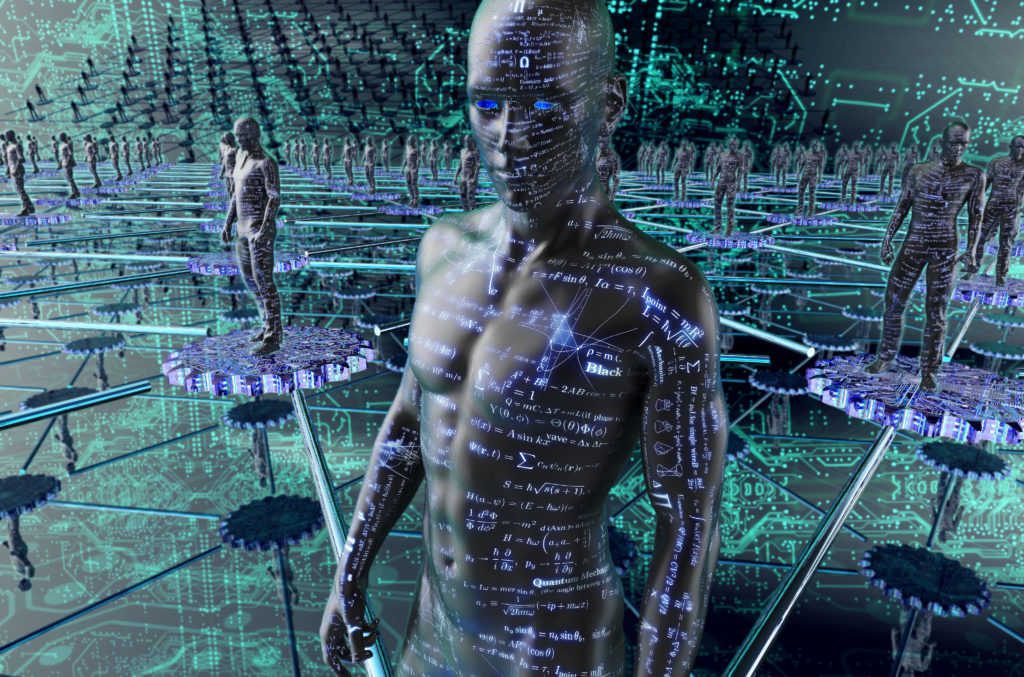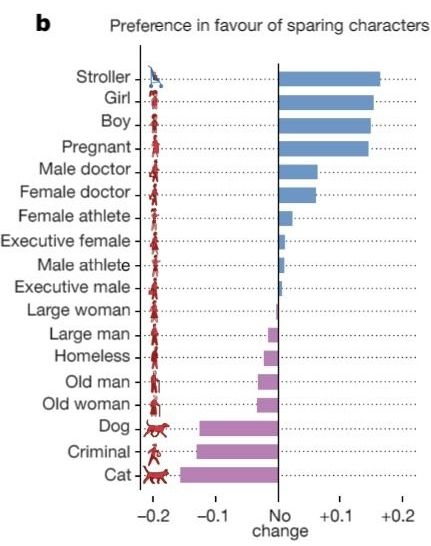There are, of course, minor variants, but it turns out that moral actions and principles are amazingly consistent across cultures. Anthropologists studied 60 different cultures and found seven rules that are common across cultures.
Category: ethics – Page 54

Morals versus money: How we make social decisions
The researchers found that people have a moral preference for supporting good causes and not wanting to support harmful or bad causes. However, depending on the strength of the monetary incentive, people will at one point switch to selfish behavior. When the authors reduced the excitability of the rTPJ using electromagnetic stimulation, the participants’ moral behavior remained more stable.
“If we don’t let the brain deliberate on conflicting moral and monetary values, people are more likely to stick to their moral convictions and aren’t swayed, even by high financial incentives,” explains Christian Ruff. According to the neuroeconomist, this is a remarkable finding, since: “In principle, it’s also conceivable that people are intuitively guided by financial interests and only take the altruistic path as a result of their deliberations.”
Our actions are guided by moral values. However, monetary incentives can get in the way of our good intentions. Neuroeconomists at the University of Zurich have now investigated in which area of the brain conflicts between moral and material motives are resolved. Their findings reveal that our actions are more social when these deliberations are inhibited.
When donating money to a charity or doing volunteer work, we put someone else’s needs before our own and forgo our own material interests in favor of moral values. Studies have described this behavior as reflecting either a personal predisposition for altruism, an instrument for personal reputation management, or a mental trade-off of the pros and cons associated with different actions.
Impact of electromagnetic stimulation on donating behavior
A research team led by UZH professor Christian Ruff from the Zurich Center for Neuroeconomics has now investigated the neurobiological origins of unselfish behavior. The researchers focused on the right Temporal Parietal Junction (rTPJ) — an area of the brain that is believed to play a crucial role in social decision-making processes. To understand the exact function of the rTPJ, they engineered an experimental set-up in which participants had to decide whether and how much they wanted to donate to various organizations. Through electromagnetic stimulation of the rTPJ, the researchers were then able to determine which of the three types of considerations — predisposed altruism, reputation management, or trading off moral and material values — are processed in this area of the brain.

The Search for New Physics & CERN’s FCC Future Circular Collider
It is a few years since I posted here on Lifeboat Foundation blogs, but with the news breaking recently of CERN’s plans to build the FCC [1], a new high energy collider to dwarf the groundbreaking engineering triumph that is the LHC, I feel obliged to write a few words.
The goal of the FCC is to greatly push the energy and intensity frontiers of particle colliders, with the aim of reaching collision energies of 100 TeV, in the search for new physics [2]. Below linked is a technical note I wrote & distributed last year on 100 TeV collisions (at the time referencing the proposed China supercollider [3][4]), highlighting the weakness of the White Dwarf safety argument at these energy levels, and a call for a more detailed study of the Neutron star safety argument, if to be relied on as a solitary astrophysical assurance. The argument applies equally to the FCC of course:
The Next Great Supercollider — Beyond the LHC : https://environmental-safety.webs.com/TechnicalNote-EnvSA03.pdf
The LSAG, and others including myself, have already written on the topic of astrophysical assurances at length before. The impact of CR on Neutron stars is the most compelling of those assurances with respect to new higher energy colliders (other analogies such as White Dwarf capture based assurances don’t hold up quite as well at higher energy levels). CERN will undoubtedly publish a new paper on such astrophysical assurances as part of the FCC development process, though would one anticipate it sooner rather than later, to lay to rest concerns of outsider-debate incubating to a larger audience?

Chinese scientist who gene-edited babies fired
A Chinese scientist who created what he said were the world’s first “gene-edited” babies evaded oversight and broke ethical boundaries in a quest for fame and fortune, state media said on Monday, as his former university said he had been fired.
He Jiankui said in November that he used a gene-editing technology known as CRISPR-Cas9 to alter the embryonic genes of twin girls born that month, sparking an international outcry about the ethics and safety of such research.
Hundreds of Chinese and international scientists condemned He and said any application of gene editing on human embryos for reproductive purposes was unethical.

Why it is dangerous to build ever larger big bang machines
CERN has revealed plans for a gigantic successor of the giant atom smasher LHC, the biggest machine ever built. Particle physicists will never stop to ask for ever larger big bang machines. But where are the limits for the ordinary society concerning costs and existential risks?
CERN boffins are already conducting a mega experiment at the LHC, a 27km circular particle collider, at the cost of several billion Euros to study conditions of matter as it existed fractions of a second after the big bang and to find the smallest particle possible – but the question is how could they ever know? Now, they pretend to be a little bit upset because they could not find any particles beyond the standard model, which means something they would not expect. To achieve that, particle physicists would like to build an even larger “Future Circular Collider” (FCC) near Geneva, where CERN enjoys extraterritorial status, with a ring of 100km – for about 24 billion Euros.
Experts point out that this research could be as limitless as the universe itself. The UK’s former Chief Scientific Advisor, Prof Sir David King told BBC: “We have to draw a line somewhere otherwise we end up with a collider that is so large that it goes around the equator. And if it doesn’t end there perhaps there will be a request for one that goes to the Moon and back.”
“There

Blockchain: 6 Key Ethical Considerations
Blockchain shows major potential to drive positive change across a wide range of industries. Like any disruptive technology, there are ethical considerations that must be identified, discussed, and mitigated as we adopt and apply this technology, so that we can maximize the positive benefits, and minimize the negative side effects.
Own Your Data
For decades we have sought the ability for data subjects to own and control their data. Sadly, with massive proliferation of centralized database silos and the sensitive personal information they contain, we have fallen far short of data subjects having access to, let alone owning or controlling their data. Blockchain has the potential to enable data subjects to access their data, review and amend it, see reports of who else has accessed it, give consent or opt-in / opt-out of data sharing, and even request they be forgotten and their information be deleted.
Monetize Your Data

Dialog, Social Futurism and a Zero State Condition
Childhood’s End
Dr. Twyman developed the idea of social futurism which can be characterized as the idea of using technology to solve social problems. Dr. Twyman has tried two variations to drive interest in the community as well as some political efforts external to that. The most recent incarnation of this was an ARG (alternate reality game). Whether you thought his approaches to Zero State and Social Futurism were good or not, the idea of Social Futurism is something we need more people to talk about.
While the details to me are unimportant in most things the central idea IS important. With Social Futurism it evolves out of the same moral and ethical model that includes a deep respect and needs to help those around us, something I think more of us and should include as part of our lives and the message we share with others through our actions and the example we set.
With the changes on the various Zero State forums, I would like to invite anyone thinking about Social Futurism and related ideas to comment.

Friedrich Dürrenmatt’s ‘The Physicists’
On January 5, 1921, Swiss author and dramatist Friedrich Dürrenmatt was born. Dürrenmatt was a proponent of epic theatre whose plays reflected the recent experiences of World War II. The politically active author ‘s work included avant-garde dramas, philosophical crime novels, and macabre satire. Especially his play “The Physicists” ( 1961 ) deals with questions of scientific ethics and humanity ‘s ability to handle its intellectual responsibilities.
“A story is not finished, until it has taken the worst turn.” (Friedrich Dürrenmatt)
Friedrich Dürrenmatt was born in Konolfingen, a small town about thirteen miles from Bern in the Emmental in Switzerland, the son of a Protestant pastor. The family moved to Bern in 1935. Dürrenmatt began studies in philosophy, German language and literature at the University of Zurich in 1941, but moved to the University of Bern after one semester. It was here that he first became interested in playwriting after becoming a regular patron of the operettas. Among his favorite playwrights were Aristophanes and Thornton Wilder.[3] In December 1943 he was on the point of transferring from the University of Zürich to the University of Bern, where he intended to write a doctoral dissertation on “Kierkegaard and the Tragic ”, when he suddenly decided to turn to writing as a career and dropped his academic career. In 1945–46, he wrote his first play It is Written, which premiered to great controversy.

A self-driving car can choose who dies in a fatal crash. These are the ethical considerations
Can machines make moral choices?
A massive new survey developed by MIT researchers reveals some distinct global preferences concerning the ethics of autonomous vehicles, as well as some regional variations in those preferences.
The survey has global reach and a unique scale, with over 2 million online participants from over 200 countries weighing in on versions of a classic ethical conundrum, the “Trolley Problem.” The problem involves scenarios in which an accident involving a vehicle is imminent, and the vehicle must opt for one of two potentially fatal options. In the case of driverless cars, that might mean swerving toward a couple of people, rather than a large group of bystanders.
“The study is basically trying to understand the kinds of moral decisions that driverless cars might have to resort to,” says Edmond Awad, a postdoc at the MIT Media Lab and lead author of a new paper outlining the results of the project. “We don’t know yet how they should do that.”
Draft Ethics guidelines for trustworthy AI
This working document constitutes a draft of the AI Ethics Guidelines produced by the European Commission’s High-Level Expert Group on Artificial Intelligence (AI HLEG), of which a final version is due in March 2019.